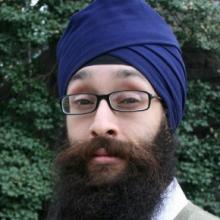Wade Michael Page
PARDEEP KALEKA and former white supremacist Arno Michaelis clasped hands during a radio interview on the first anniversary of a mass shooting that changed both of their lives. Their embrace was the ultimate symbol of brotherhood—two starkly different backgrounds united by a common goal of peace and understanding in an oftentimes cruel and unforgiving world.
Pardeep Kaleka is a member of the Sikh faith community. His father was one of the six worshippers killed on Aug. 5, 2012, at the Sikh temple, or gurdwara, in Oak Creek, Wis. Three more were injured that day before the man opening fire on the temple was wounded by the police. The gunman then prepared for one final pull of the trigger, taking his own life.
The shooter was Wade Michael Page, a white supremacist, acting on his own volition that Sunday morning. He had spent his life practicing violence and hatred toward all kinds of people he felt to be “different” from him. This hatred culminated in a final unthinkable act, killing six people in cold blood at their holy place of worship.
There was angst, confusion, and grief among the Wisconsin Sikh community after this terrible tragedy. But where many may have expected anger from those most deeply affected, the Sikhs responded with something thoroughly refreshing: peace.
Shortly after teenagers beat up a Columbia University physician Saturday, a Muslim woman was attacked a few blocks away.
It is not clear whether the attacks on Dr. Prabhjot Singh and the Muslim woman, who were both treated at Mount Sinai Hospital in New York, are related. But many say the motives, if not the perpetrators, are depressingly familiar.
They are part of a long line of assaults on Sikhs, who are sometimes mistaken for Muslims; on Muslims; and, more generally, on people perceived as foreigners.
